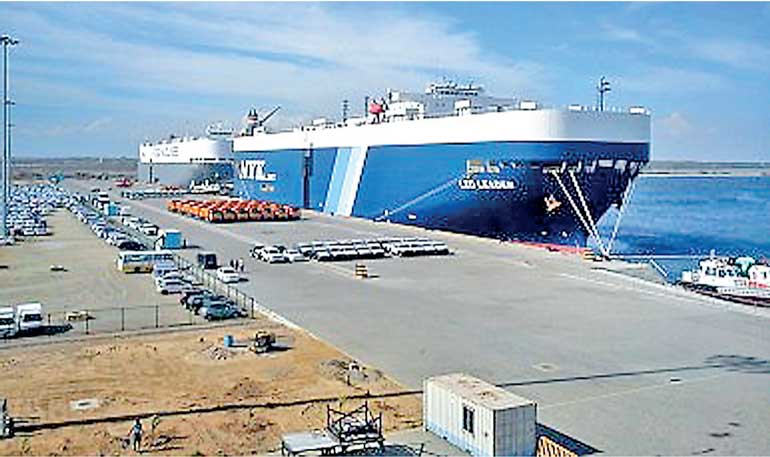Friday Feb 27, 2026
Friday Feb 27, 2026
Tuesday, 25 July 2017 01:07 - - {{hitsCtrl.values.hits}}

Cabinet is scheduled to decide on the future of the Hambantota Port, built by former President Mahinda Rajapaksa through a loan costing Rs. 193 billion, which has since accumulated a loss of Rs. 47 billion.
Following many rounds of negotiations as well as months of scrutiny and revisions due to concerns, a restructure of the Hambantota Port has been proposed under a public-private partnership whereby the
Government via the Sri Lanka Ports Authority (SLPA) becomes the public equity partner and investor, becoming the private equity partner with China Merchants Ports Holdings Company Ltd. (CMPort).
For this, the SLPA is to incorporate two special purpose companies each carrying out port-related activities. All assets of the Hambantota Port, including the land belonging to the port, are to be transferred to the two companies, capitalising the two companies to a value of $ 1.4 billion, which is the transaction value.
One company is Hambantota International Port Services Co. Ltd. (HIPS), with a $ 606 million capitalisation, which will undertake the management of the common user facilities and services of the Hambantota Port such as port security, navigational services, pilotage, anchorage, the provision of aids to navigation, dredging, widening (capital and maintenance), emergency responses, pollution control and other port services. The shareholding of this company will be SLPA 50.7% (42% of shares directly by the Ports Authority and a further 8.7% of share indirectly through (HIPG) and CM Port 49.3%.
The other company is the Hambantota International Port Group Ltd., (HIPG) which, with a $ 794 million capitalisation, is to undertake the management of operational assets of the port, further development of the Hambantota Port, its infrastructure and commercialisation of cargo handling and related operations.
The composition of shareholding will be identical to the terminal operation projects at the Port of Colombo i.e. the South Asia Gateway Terminals (SAGT) and Colombo International Container Terminals
(CICT), which means SLPA will hold 15% and CMPort 85%.
Based on this composition of shares, the overall shares held by CMPort will be 69.55%, while the overall shares held by Ports Authority will become 30.45%, as opposed to the initially proposed 80:20 split.
Since such a split in shares will result in a deficit of $ 146 million from the agreed investment value of $ 1.12 billion, CMPort, abiding by the framework agreement already executed, will be required to bring the deficit of $ 146 million for investment in the Hambantota Port area simultaneously without reducing the initially agreed investment value.
As per the proposed move, CMPort agrees to sell to the SLPA a further 20% equity of the HIPG within a period of 10 years at a value to be determined by an independent valuer.
The term of the concession agreement is 99 years with provisions with the right for the Ports Authority to purchase the shares upon the expiry of 70 years or the transfer of majority (60%) ownership to the Ports Authority in 80 years. CMPort and SLPA will be strictly required to prevent engagement by the two companies in any form of military-related activities. This is because the sole responsibility and authority for such activity and national security of the Hambantota Port lies with the Government.
The Government will also have the authority to grant permission, clearance and approval to berth naval vessels at the port on mutually agreed payment terms.
For managing security within and outside the port, an oversight committee convened by the SLPA, which includes the Sri Lanka Navy, Sri Lanka Police and a representative of the Secretary to the Ministry of Defence, will be set up by the Ministry of Ports and Shipping.
All personnel involved in security services and related matters of the two companies will be Sri Lankan nationals.
The Government has previously stated that a further investment of around $ 600 million is needed to equip the Hambantota Port and make the port fully operational. The annual loan repayment commitment for SLPA on a past project loan is around Rs. 9.1 billion.
The Hambantota Port commenced its commercial operations in November 2011 and at the end of
2016 its accumulated loss amounted to over Rs. 46.7 billion.
The PPP mooted by the Government was ascertained after the port’s severe underperformance, coupled with the heavy burden of the repayment of the loans and the impact on the country’s macroeconomic stability.
However, based on what was proposed, shipping industry experts were wary.
They claimed that by creating two companies the public has been hoodwinked to show Sri Lanka owning 50% of one company, which is not true. The SLPA will have less than 50% as the majority of HIPG control will be with China, hence HIPS will be technically controlling the operations of HIPS.
Their other reservation was that the most valuable business of shipping, which is the terminals, has been given to China on 85% and SLPA 15% which means in the medium to long run China will control the proposed 33 berths in Hambantota and three in CICT in Colombo.
Another aspect is CMPort has been given controlling power of both companies which is non-existent in the Colombo Port.
The 99-year lease period remains but SLPA has been given a buyback arrangement only starting at 70 years and 80 years with the terms of the total valuation at that time.
“Anything over 30-35 years is detrimental to the country’s interest as the port business circle has to be re-valued at least every 30 years and renegotiated at a new valuation,” said analysts.
It was also opined that the transaction value does not include land valuation for 99 years as agreed. Only the cost of construction is $ 1.5 billion and transaction value is $ 1.4 billion and this agreement is not a landlord model but a split of assets into two companies.